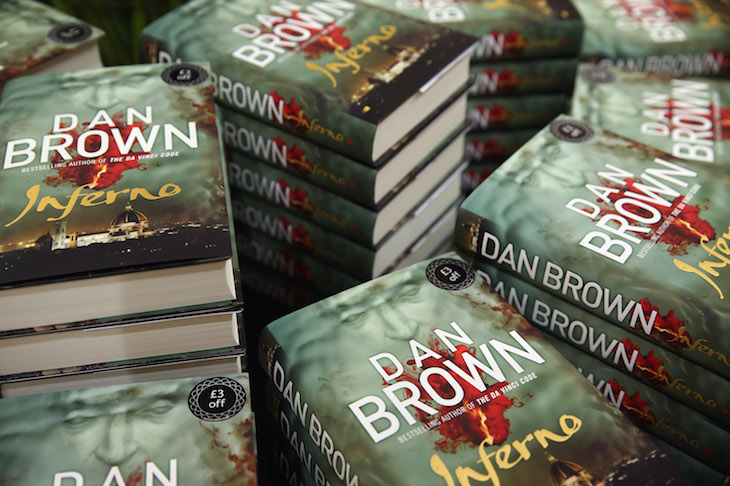Bill Greenwell Langdon stared steadily with his questing blue eyes at the poem the balding gigolo penned. What was it about the scansion? His heart pounded like a lineman’s hammer. A sonnet! An old form, invented by Giacomo da Lentini. 1230.
‘The Magna Curia!’ said Langdon out loud.
A voice came from the night-coloured darkness, interrupting his thought with a curdling scream. ‘Mind the volta!’ it screeched…
A sonnet! ‘I was here like a psalm,’ it began effortlessly. A psalm! As in church, as in Holy Roman Empire! Langdon felt a hot shock of recognition, almost passing out. Still conscious, he saw a hand come at him, with a poison quill, followed by a velvet-clad arm…
Suddenly, Langdon realised the truth.
It was no Holy Roman. That was a trick. He seized the advancing shoulder, thrusting his assailant to the frigid ground. I was here like a psalm!
William Shakespeare!
G.M. Davis Ad maiorem Dei gloriam.
Even Robert Langdon, highly educated sophisticate and intimate of world authorities that he was, held his breath in suspension, recalling the historic words of Saint Ignatius of Loyola, a small location in the Basque country of Spain, as he marvelled at the wondrous sight before him.
The Cathedral Basilica of Saint Cecilia, familiarly known to the lay world as Albi Cathedral. A brick-built testament to the Wars of religion that could withstand an army. A very large, aggressive army, he reasoned.
The poor Cathars.
Inside were the famous interior wall paintings, or peintures murales, a legendary theological record he was sworn to decode using incredible 21st-century algorithms.
He knew many of the faithful held that mixing the sacred and the profane was dangerous — but who better than he to test the proposition? Opening his laptop, he never saw the thunderbolt coming.
Basil Ransome-Davies Robert Langdon smiled while checking his Mickey Mouse watch against Big Ben, though he knew the world-famous appellation applied originally only to the bell in the clock tower. Call it a synecdoche, he mentally told himself, without uttering the word aloud. On the luxurious Cessna Citation Bravo with its Primus 1000 avionics that bore him over the Atlantic he had quizzed why the British PM — not known for her interest in noetic matters, his White House contacts reported — had requested a meeting.
He was shortly, and shockingly, to find out, as she concluded a frightful, enigmatic tale of horror, mystery and deception by imploring him, ‘What does it all mean?’
Langdon carefully stroked his chin. It would be cruel to laugh. BRIT, torn by the E of Europe and X, the crux decussata of Scotland.
So obvious. And tragic. But how could he tell this poor, demented woman?
D.A. Prince His erudite features composed into a wrinkled map of emotionless thought, Gideon Golding weighed up the options facing him in the darkness, letting his closed eyes light on each one in turn. He held the Grail tight in his right hand while his left absently caressed the arm of the 16th-century mahogany Chippendale desk chair in front of his computer. A world-beating hiding place? His pursuers were nearly upon him, intent on abusing the Grail’s iconic status as an icon for their own unspeakable ends. His massive HiSec UltraTitanium bomb-proof safe was too obvious and he hadn’t put himself through the plethora of gruelling extremes to rescue this precious jewel-encrusted chalice to succumb to the evil masters of the Fayth.
Outside in the pitch dark the solution caught his eye. The anonymous plastic box with the inscription Recyclables on its lid. No one would move that.
Chris O’Carroll The tall, brown-eyed software designer shifted his penetrating brown eyes from the interstellar warfare on one computer screen to the lines of code glowing on the other screen like a silent, motionless, horizontal fireworks display. He knew that the Moscow-based software firm behind this game had known ties to the Kremlin, the headquarters of the Russian government at its highest levels, and that Yuri, Putin’s legendary mastermind hacker, had developed a revolutionary technique for inserting lethal spyware into seemingly innocent game code. The CIA had made it a top priority to steal this prototype and learn everything it could reveal about Russian hacking schemes.
The athletically built software designer spotted some telltale lines of Yuri’s code, and reached for his keyboard to plot a counterattack. Not until Yuri appeared on the screen, flanked by Putin and the Pope, did he comprehend how completely he’d fallen into the Russian hacker’s trap.
Rob Stuart The renowned, brown-haired symbologist frowned at the image of a taxi burned into the dead corpse’s back, his forehead creasing like a bit of cloth. ‘Do you remember what the Cardinal said just before he died?’ he asked Nastassia, the svelte, blonde-haired ex-KGB agent.
‘Da,’ she said with her Russian accent, fixing him with eyes as blue as blue paint. ‘That he was having a coronary.’
‘Or did he say “coranry”? An anagram of “Carry On”. What if these brandings are all references to the British comedy movie franchise, 1958–92; a toilet for “At Your Convenience”, a mortar board for “Teacher”, a taxi for “Cabby”?’
‘So if we can find all 31 bodies and plot their locations on to a map of, say, Venice…’
‘…Then it’ll reveal the missing portion of the Nostradamus Sudoku and thus the encrypted co-ordinates of Ramesses VIII’s undiscovered tomb! Why didn’t I see it before?’
Your next challenge is to submit a poem of up to 16 lines inspired by the shipping forecast. Please email entries to lucy@spectator.co.uk by midday on 29 November.





Comments